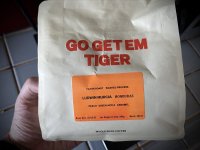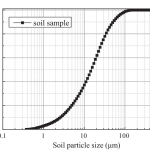"Channeling" during brewing process can lead to non-uniform filtration and lower extraction yield.
See full article...
See full article...
You would probably love the American Chemical Society's webinar series then, at least the episodes related to food.I love that coffee is at this interesting intersection of science, engineering, and culinary arts where we are able to theoretically pursue with great precision a highly subjective result.

This goes against my experience? If it brews too fast it comes out like acidic coffee. If too slow, it’s bitter. it’s always a dance between grind size and how hard I tamp, and it changes depending on the bean. I usually end up tossing two shots when getting a new bag until I find the right combo. Maybe this does mean I am grinding too fine…"They concluded that the most reproducible thing you can do is use fewer coffee beans and opt for a coarser grind with a bit less water; brew time was largely irrelevant."
I'm working on Cappuccino with quantum foamI look forward to when we can elucidate a detailed quantum chromodynamics breakdown of the the various quarks and gluons involved in creating a great cup of espresso.
Kidding of course. I know nothing of quantum math. I do think it fascinating that we can dive deep into the science of the various factors that go into creating a great cup of espresso.
Agreed, it's an excellent tool.One of the best tools for minimizing channelizing and maximizing repeatability in espresso is the Umikot. It is 3D printable and uses the same principle as a spirograph to stir every portion of your espresso equally. It is available for free here: https://www.printables.com/model/481587-umikot-58mm-version-planetary-gear-spirograph-espr
I highly recommend it!
All the grad students were experimenting with optimal methods of coffee brewing anyway, but in a non-systematic way with different labs duplicating each others' research and not effectively sharing their results.Man, these guys found an enviable niche of physics.
Nit pick: not immersion brewing methods, e.g. French press.It's worse than under-extraction, it's under-extracted overall but some grounds near the channeling are massively over-extracted, this leads to a taste profile that contains the undesirable properties of both types of bad extraction. All coffee suffers from channeling to some degree, but if you don't prep the puck correctly in Espresso it can be really bad leading to both overly bitter and overly sour notes. The ways to fight it are puck prep, pre-infusion (where you wet the grounds before applying full pressure), and a descending pressure profile (where the pressure of the heated water is decreased through the ~30-40s pour to reduce the erosion of the puck).
There is, and I swear I’m not making this up, a software package called Quantum ESPRESSO which is a popular tool for ab initio quantum calculations of various materials.I look forward to when we can elucidate a detailed quantum chromodynamics breakdown of the the various quarks and gluons involved in creating a great cup of espresso.
Kidding of course. I know nothing of quantum math. I do think it fascinating that we can dive deep into the science of the various factors that go into creating a great cup of espresso.
Whatever works for you is what's best. But I just give my beans (15g) a couple quick mists with tap water from a cheap little atomizer and check them into a Baratza Encore and I have no static problems.However, I should note that a "...squirt of water..." seems pretty "coarse" to me. The beans need a very light, even coating of moisture prior to grinding. We use a pretty good mister with distilled water, and shake the beans after each mist (4 total for 55 grams of beans for drip).
This is an enormously silly and snobby and weird statement. It is most certainly not the ONLY way, don't be ridiculous. Maybe it's a GREAT way! Not the same as "only".Final note: Home roasting is the ONLY way to understand good coffee. Although not affiliated in any way, I strongly suggest you investigate Behmore (roaster) and SweetMarias (green beans -- always buy farmgate with newest release date).

It's been a long time since I've made beer, but I used to get good results with batch sparging and great results when I didn't sparge at all. It's also quicker and simpler.I've experienced channeling first-hand, making beer. Imagine extracting the good stuff from the grain in a process where the water flows through the grain bed. I get far better yields if I introduce periodic stirring into the process than I do if I keep the grain bed intact the whole time.
Small engineering business owner here, with a team who 'quite' like coffee. I'm already thinking of adding an extra PLC to our next order for some PID control, and I've been looking for an excuse to get a Labview licence and DAC...I'm seeing "How to trick corporations into funding your labs coffee habit".
I love my $300+ Breville.This goes against my experience? If it brews too fast it comes out like acidic coffee. If too slow, it’s bitter. it’s always a dance between grind size and how hard I tamp, and it changes depending on the bean. I usually end up tossing two shots when getting a new bag until I find the right combo. Maybe this does mean I am grinding too fine…
I also have a shitty Breville machine and I don’t think it’s hot enough anyway.
Funny how my entire day revolves around optimizing Java in some form. Now we have to worry about supply-chain attacks in the form of tariffs.

